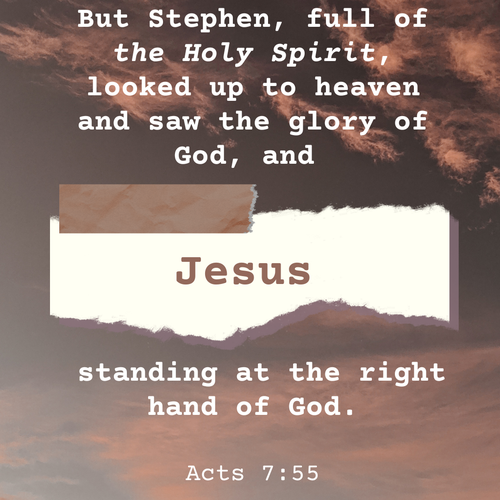Stephen: The First Christian Martyr

In Chapter six, we see Stephen's arrest and trial. Stephen—full of the Spirit, full of faith, full of wisdom, full of power— debated with the Synagogue of the Hellenist, but they were no match for him. They were unable to resist his wisdom and his reasoning. So instead, they put forward false witnesses to frame him. In his trial, Stephen was accused of blasphemy—speaking against the temple and Law (cf. Leviticus 24:16)—and apostasy—that Jesus will destroy the temple and alter the customs of Moses (cf. Deuteronomy 13:1-5)— two serious charges punishable by death. Although not entirely untrue, the charges were based on twisting what Stephen had said, just like in the trial of the Lord Jesus.
One can feel the tension building up towards the end of Chapter Six as one anticipates the danger Stephen is in. Those opposed to Stephen have persuaded false witnesses to make the charge, incited the people, and brought Stephen before the Sanhedrin. Every effort is being made to put a stop to his preaching permanently.
Instead of mounting a defense, Stephen goes on the offensive using the most powerful weapon, the Scripture. Although Stephen’s speech subtly addresses the charges throughout the speech, it ultimately redirects these charges toward his accusers. Following in the steps of the Apostle Peter, Stephen gives them a sermon and a rebuke.
Stephen's speech before the Sanhedrin highlights two ideas.
Stephen answers the charge of blasphemy by accusing the leaders of Israel of having an inappropriate understanding of how the law truly works and the purpose of the temple. Consequently, they had an inadequate understanding of Jesus, His followers, God’s will, and ultimately God Himself.
They thought God can be merely worshipped in Jerusalem. However, Stephen explains that God can never be tied down to one land or place. Correspondingly, His people are closest to Him when they are sojourners continually looking to Him for sustenance. They thought God can be merely worshipped in the Temple, but God is the Creator of all things. No temple can confine Him. Ironically, Israel could have offered true worship to God through the Messiah, but by rejecting Him, they were rejecting what the temple was ultimately all about.
The Council and their cohort would not even let Stephen finish his speech as he pointed to their guilt of killing their own Messiah and breaking the law themselves. They "rushed at him with one impulse" (v.57), drove him outside of Jerusalem, and stoned him. As he died, he said three things. One, he witnessed to the Messiah being glorified in heaven, perhaps as a last appeal to them. Two, he asked the Lord to receive his spirit. Three, he asked the Lord not to hold this sin against them, just as the Lord Jesus had done on the cross.
When Stephen saw a vision of heaven, the Lord Jesus was not sitting on the right hand of God as commonly portrayed. Rather, the Lord Jesus was standing as if to embrace Stephen, the first Christian martyr. The word martyr is a transliteration of the Greek word translated "witnesses" in Acts 1:8. Jesus told the disciples, "you will be my martyrs", namely, my faithful witnesses even unto death. So, Stephen is not a martyr because he died for the faith; he died for the faith because he is a martyr.
Are you a martyr?
One can feel the tension building up towards the end of Chapter Six as one anticipates the danger Stephen is in. Those opposed to Stephen have persuaded false witnesses to make the charge, incited the people, and brought Stephen before the Sanhedrin. Every effort is being made to put a stop to his preaching permanently.
Instead of mounting a defense, Stephen goes on the offensive using the most powerful weapon, the Scripture. Although Stephen’s speech subtly addresses the charges throughout the speech, it ultimately redirects these charges toward his accusers. Following in the steps of the Apostle Peter, Stephen gives them a sermon and a rebuke.
Stephen's speech before the Sanhedrin highlights two ideas.
- The nation of Israel has consistently failed to recognize and follow the leaders that God has raised for them. Instead, they had a pattern of resisting and rejecting God's ordained leaders. That pattern ultimately culminated in their rejection of the Messiah. However, just like Joseph and Moses were accepted as leaders on their second "visit", Jesus, who had been initially rejected, can come back if they would accept Him. Peter had also made the same offer to the nation earlier in Acts.
- Two, the nation of Israel had consistently failed to respond appropriately to God by falling into idolatry.
Stephen answers the charge of blasphemy by accusing the leaders of Israel of having an inappropriate understanding of how the law truly works and the purpose of the temple. Consequently, they had an inadequate understanding of Jesus, His followers, God’s will, and ultimately God Himself.
They thought God can be merely worshipped in Jerusalem. However, Stephen explains that God can never be tied down to one land or place. Correspondingly, His people are closest to Him when they are sojourners continually looking to Him for sustenance. They thought God can be merely worshipped in the Temple, but God is the Creator of all things. No temple can confine Him. Ironically, Israel could have offered true worship to God through the Messiah, but by rejecting Him, they were rejecting what the temple was ultimately all about.
The Council and their cohort would not even let Stephen finish his speech as he pointed to their guilt of killing their own Messiah and breaking the law themselves. They "rushed at him with one impulse" (v.57), drove him outside of Jerusalem, and stoned him. As he died, he said three things. One, he witnessed to the Messiah being glorified in heaven, perhaps as a last appeal to them. Two, he asked the Lord to receive his spirit. Three, he asked the Lord not to hold this sin against them, just as the Lord Jesus had done on the cross.
When Stephen saw a vision of heaven, the Lord Jesus was not sitting on the right hand of God as commonly portrayed. Rather, the Lord Jesus was standing as if to embrace Stephen, the first Christian martyr. The word martyr is a transliteration of the Greek word translated "witnesses" in Acts 1:8. Jesus told the disciples, "you will be my martyrs", namely, my faithful witnesses even unto death. So, Stephen is not a martyr because he died for the faith; he died for the faith because he is a martyr.
Are you a martyr?
Posted in Book of Acts
Recent
Habakkuk 2:4b — The Just Shall Live By Faith
February 20th, 2026
Habakkuk 1:12–2:1— Appealing to the Throne of God
February 13th, 2026
Habakkuk: Trusting God in Troubled Times
February 6th, 2026
John 20:18–31 — Believing is Seeing
January 16th, 2026
John 20:1–17 — Love Turns Grief into a Mission
January 10th, 2026
Archive
2026
2025
October
2024
February
March
April
May
July
October
November
December
Advent 2024 Devotion: December 2Advent 2024 Devotion: December 3Advent 2024 Devotion: December 4Advent 2024 Devotion: December 5Advent 2024 Devotion: December 6John 3:16-21 — For God So Loved the WordAdvent 2024 Devotion: December 7Advent 2024 Devotion: December 8Advent 2024 Devotion: December 9Advent 2024 Devotion: December 10Advent 2024 Devotion: December 11Advent 2024 Devotion: December 12Advent 2024 Devotion: December 13Advent 2024 Devotion: December 14Advent 2024 Devotion: December 15Advent 2024 Devotion: December 16Advent 2024 Devotion: December 17Advent 2024 Devotion: December 18Advent 2024 Devotion: December 19Advent 2024 Devotion: December 20Advent 2024 Devotion: December 21Advent 2024 Devotion: December 22Advent 2024 Devotion: December 23Advent 2024 Devotion: December 24Advent 2024 Devotion: December 25
2023
January
February
March
April
May
